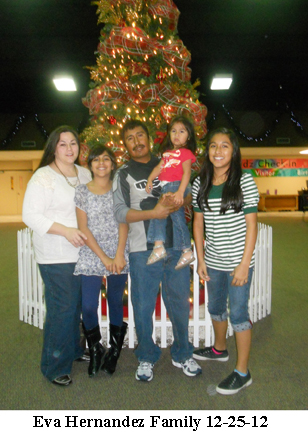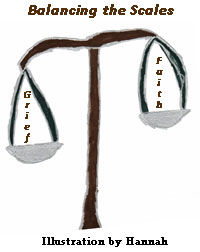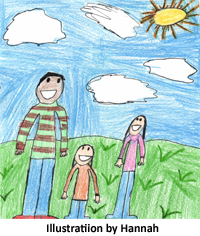
Today, I want to share an interview I had with an amazing young woman by the name of Eva Hernandez. Her story of family shared grief stretches from her home in Orange, Texas, to Mexico.
On June 26, 2013, Eva received a phone call from her husband’s employer informing her that her husband had been in an accident. She was told to meet him at the hospital in Beaumont, Texas, 25 miles away. Shortly after her arrival, Eva was informed her husband Juan of 12 years and the father of their three children had passed away.
Eva, before we talk about that day, describe Juan to us.
Juan and I met during a season in our lives when neither of us was living for the Lord at a bar in Beaumont February, 1998. He had been in the United States about a year when we met. If you would have asked either of us if we were looking for the other, the answer would have been a huge “NO!” We just kind of happened upon each other and it just felt right.
Juan was the hardest working person I have ever met. One of 11 children, he started working at the age of 13 taking care of his father’s and other families’ sheep herds. An avid hunter, he used a sling-shot to kill rabbits for the family to have food.
He eventually went to work in the potato fields about 2 hours from home in Leon, Guanajuato, learning every job available to help support his family. He sorted and loaded potatoes on the trucks during the day. Many nights he took care of the sprinkler systems and was a look-out in case someone tried to steal potatoes. When returning home for a visit, he brought his pay, a 50 lb. sack of potatoes, and shoes or clothes for his younger siblings.
Juan was a good provider for his parents and us, never missing a day of work. He came home from work happy, never in a bad mood, greeted each of us with a kiss and a hug, and asked how our day went. He was never shy about showing our girls he loved them. Juan was our rock, strong and stable, faithful, stern, but loving.
Now, take us back to Wednesday, June 26, 2013, the day of the accident.
The day started out the same as any other day. I made Juan’s lunch, saw him off to work, took Anayeli, our ten-year-old daughter, to VBS and came home to start the rest of my day. He called me at 9 AM on his morning break and the conversation was basically a repeat of other days. As you might imagine, I was only half paying attention.
Towards the end of the conversation, he started telling me about hundreds of butterflies flying around his worksite. The fact that they were white fascinated him. I could hear the excitement in his voice. He told me to kiss the girls, tell them he loved them, and we said our last goodbye.
The next call came about an hour and twenty minutes later. I had just gotten in the shower when Mayra, our thirteen-year-old daughter, came to tell me someone from her Dad’s work was calling. Not thinking much of it, I told her to tell them that I would call them back in 10 minutes. My mind started racing, wondering why they were calling. It was the longest 10 minute shower I have ever taken.
Before I could get dried off, the phone rang again and this time I answered. The lady on the other end said, “Mrs. Hernandez, your husband has been involved in an accident and is being transported to the hospital; you need to meet him there.” I quickly dressed and dropped my two-year-old daughter, Ofelia, and Mayra off at my mother’s. Mayra chose not to go to the hospital with me; I guess she was scared.
Just as I was driving into the driveway at mother’s house, the third call came saying the owner of the company would meet me at the hospital. That’s when I knew in my gut what my head wasn’t wrapping around – – this situation was really bad. I kissed the girls goodbye and left. I hadn’t hit the edge of town before I started calling my friends to pray.
Just as the lady had told me, the owner and another man met me at the hospital door. He told me a piece of metal had fallen and struck Juan in the head, but he didn’t have any information beyond that. Being a nurse, my assessment, evaluation, and re-assessment kicked in. I thought, “Okay, maybe some rehab, some memory loss. Juan was strong; we had been through so much, we could make it through this, too. Whatever it took, that’s what we would do.”
Shortly, a nurse told me the news. When the paramedics had arrived at the site, Juan was unresponsive to verbal commands and barely breathing on his own, so they had intubated him. During transport, he went into cardiac arrest and passed way right after arriving at the hospital. My heart sank; all I wanted was to see him. Little did I know that he was in the same room behind the partition. I felt helpless seeing his lifeless body.
I called mama and told her Juan was gone. Next, I was faced with calling Juan’s mama in Mexico. It was difficult for me because I couldn’t be there face-to-face to comfort her in her hurt. I remember her screaming and asking me “What about us, Eva?”
Eva, you had three children to face, decisions regarding Juan’s family in Mexico, and funeral arrangements to make. How did you manage that?
Juan had made a life for himself in the states, and wanted to be buried here for our girls. Since he was a Legal Resident Alien, by law his parents and all siblings were entitled to cross the border, but I knew it was going to take work getting his family here from Mexico for the funeral. However, plans were made and his parents, one brother and two sisters met my cousin and me at the border. U.S. Customs granted them eight days to stay on a Humanitarian Parole instead of the usual three. I could see God’s hand upon us.
The bad part was that I had to be away from my girls for almost three days and when I did make it home, there were five new people in our home. The girls knew their extended family, but we never had played host to them. It was strange for them to give up their beds and space during such a time as this. Those few days now seem like a big blur because it all happened so fast; there wasn’t much time to think, just act. In the midst of this, I had to make funeral arrangements and had begun to meet with legal counsel.
Just as I thought things were settling down, another phone call came. It was the funeral director asking me about the issue of Juan’s shaved head. I was so shaken when he asked me if I had decided on a wig or a hat. I had no clue what he was talking about and he had no clue that I didn’t know his head had been shaved. Due to the nature of the accident, there had to be an autopsy and they had to shave his head. It was insult to injury and I was devastated. It was bad enough that this accident had happened, not to mention the stress I had been under of getting Juan’s family here; it was all mindboggling.
Another situation came up as I was making funeral arrangements. Juan had changed certain religious and culture beliefs he had been reared in, so I had a hard time trying to do what I knew he would have wanted and trying to appease what his parents wanted also. My thoughts were also focused in annoyance to Juan. “How could he have left us to deal with such a mess?”
A scripture was given to me that helped comfort me as I was making and breaking family traditions. Ephesians 5:31says: A man leaves his father and mother and is joined to his wife, and the two are united into one. (NLT)
This helped me realize Juan was the one who was actually making these decisions by his own previous break with his family’s religious and culture beliefs. I was just carrying out his wishes. I wouldn’t say his family agreed, but they respected them enough to abide by my wishes.
In the midst of losing Juan, you experienced a bitter-sweet time, didn’t you?
Oh, yes. I was about a month pregnant at the time of Juan’s death. I had told him a couple of days before he died that I probably was pregnant. We loved our girls very much, but had prayed for a boy to complete our family. He was so happy at the thought of bringing another one of us into the world. I will find out November 5th if it is a boy or girl. I know Juan will be just as pleased if it is another girl.
The funeral is over, Juan’s relatives return to Mexico, life begins with just you and the girls. Tell us about the next couple of months.
At 13, 10, and 3, each girl dealt with a range of emotions in their own way as I was doing. One of the girls showed no emotion and wouldn’t let anyone in; another was laughing one minute, crying out in pain the next. The three year old wasn’t able to comprehend that her papi wouldn’t ever come back. She probably will forget him within the next couple of months.
It was hard seeing my girls storm off, put their nose in books or electronics, and drown the world out with music and friends. The little one was glued to me and sometimes she was the only person in the house who talked to me. I wanted them close, but it felt like we had lost our direction. I didn’t have the words to offer them, so we just shut down.
Finally one day, things came to a head and we all broke. The older girls were able to help me see things I was and was not doing for them. I was able to get things out about how I had been feeling. As much as it hurt for each of us to have to say the things we said, we needed it.
For the first time since Juan’s passing, I began to feel a sense of God-granted-peace. We were now on this journey together and I was determined not to allow the enemy break my family any more than it already had. It was time that we got started on healing our broken hearts, but just like anything else, the first day is always the hardest.
“The LORD is close to the brokenhearted and saves those who are crushed in spirit.” Psalm 34:18.
How have you come to view loss, grief, and your faith?
“For I know the plans I have for you says The Lord, plans to keep you and prosper you, plans to give you hope and a future.” (Jeremiah 29:11)
This scripture doesn’t mean that’s the way it feels when loss is fresh or even months removed. It’s hard to see God’s plan when things happen. When loss is raw, you are confronted with what you really believe and what you say you believe. When you get down to the real emotions of grief and loss, they suddenly become two very different creatures. Even if you are grounded in faith the “why” questions will come up. God desires for us to draw into Him and it’s alright to question Him.
I have come to the conclusion that, even if God answered all of my “why” questions, it would not change anything because his understanding surpasses that of my own and it would simply lead to more questions.
Children have the toughest questions. Be open and honest with them because even a half-truth can separate them from the love that God has for them.
Another scripture that has had special meaning to me is: The righteous man perishes, and no one takes it to heart; faithful men are wept away, with no one realizing that the righteous one is swept away from the presence of evil. He will enter into peace-they will rest on their beds-everyone who lives uprightly. Isaiah 57:1-2 (HCSB)
************
And that, my friend, is spoken from the heart of a mother, who is on this journey of loss and grief with her children; all walking by faith day by day.










